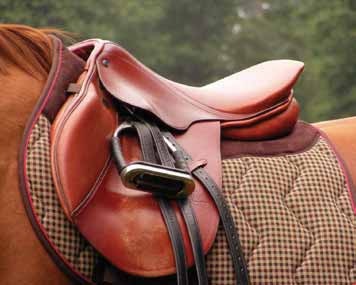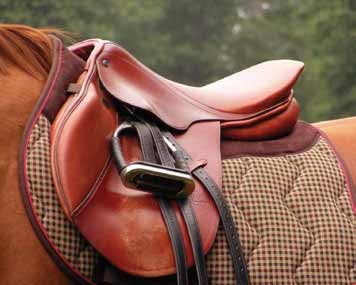I am often asked why the horse I am treating has a sore back. Sometimes the answer is as obvious as an ill-fitting saddle, or known accident or injury, or perhaps long-term arthritic changes can be identified as the probable cause. However, it is not always easy to ascertain why one horse is absolutely fine and another gets sore, seemingly at the drop of a hat. It may be that there is an underlying physical cause, as yet undetected, or it may be completely rooted in the psychological state of the horse. Most likely the answer lies somewhere between the two.
Let us look at physical causes first. Anything we put on our horses has the potential to cause rubs, sores, pressure and associated discomfort. This includes the saddle, girth, bridle, bits, rollers, rugs, training aids, and so on. We tend to think of checking the saddle fit, but we should check everypiece of equipment that goes near our horses. Be aware that a saddle that does not fit the rider can be just as problematic as one that doesn’t fit the horse. Consider how a too-large rider puts their weight down the back of the saddle; even the best fitting saddle for the horse now causes issues.
Ulcers in the mouth, sharp tooth edges, and a small area for the bit to rest in can all produce pain reflected in the position of the head, tension in the neck and back, and ongoing performance issues. At the very least, a qualified equine dentist should check the horse’s teeth every year. Similarly, the foot balance, shoeing, and foot shape should be appropriate and regularly maintained. Alterations to foot balance cause a range of changes in loading on the rest of the limbs and into the back, so although an improvement in performance after changing shoeing can be seen fairly quickly, the change can result in short-term back soreness if undertaken too quickly.
Pathological changes in the back itself may underlie an ongoing presentation of ‘sore back’ symptoms, either in terms of kissing spines or arthritic changes to the facet joints. These changes may render the horse unrideable, and diagnosis should be made by your vet. And of course, there are a multitude of other conditions not located in the back, such as spavins in the hocks that then affect the ability of the horse to work forwards correctly, and result in tension in the back musculature instead.
Accidents, falls, slips, and injuries resulting in compensatory movement patterns, can all affect the back and produce symptoms of muscle tension, pain and back discomfort over a variable period of time. So those are the main physical causes of a ‘sore back’, but what about the psychological? Can a horse really ‘think’ itself sore? Well, I would argue yes it could, although probably not in the way you are currently thinking. Let me explain.
Animals feel emotions. Without emotions, we would all be dead, as they are an evolutionary survival mechanism. Fear is the dominant emotion overriding all others, and fear allows us to quickly respond to any threat, focussing attention and action necessary within a split second, and preparing the body for a fight or flight response. Fear, anger, hunger, deception, grief, and love/care-giving have all been demonstrated in animal behaviour. In fact, animals’ brains were initially used experimentally to ascertain where these emotions lie biologically within us. Create lesions in the brains of dogs within the lateral amygdala and sham rage is exhibited towards handling that was previously enjoyed. Interfere with the hypothalamus of a monkey and you will lose all goal-directed feeding behaviours, as the emotionality associated with hunger is lost.
What has this to do with a ‘sore back’? Emotionality within individuals varies. Think about it and you will be able to identify one person that is very calm in the face of disaster and another that runs around like the old boy in Dad’s Army shouting “don’t panic!” Horses vary in the same way, with some ‘seeing disaster’ around every turn and others taking their time to assess every new situation in a seemingly relaxed way. In a natural setting, away from domestication, my bets would be on the higher emotionality individual surviving longer, but this type of horse is the more challenging in our domesticated environment. The downside to living with higher emotionality is the increases in stress hormones released and priming of the muscular system for action on a very regular basis. A ‘stressy’ horse is much more likely to carry a higher muscle tone, and show symptoms of soreness and sensitivity sooner than the more relaxed individual that maintains a more phlegmatic approach to life.
Can this ‘stressy’ type of horse really make itself sore through stress alone? Yes, I think it can. Factors that increase the chances of this include a lack of exercise, time kept alone, and a rigid training programme. Plenty of exercise, interaction with others and variability of exercise are often the best ways to channel these sensitive individuals into a calmer emotional world.
For most horses I see, there is a physical component to the cause of their symptoms, and in many cases these are the easier things to address. However, there are also those cases I see on a regular basis that get tight and sore in part, if not entirely, due to their ‘high stress’ outlook on life. Horses that never really relax properly display unusually high sensitivity to almost everything. For those horses, the only answer is to keep up a varied work programme, ensure they are able to socialise with those horses they like most and are likely to relax with, and to book in for therapy on a maintenance programme basis. What is lovely is the way these horses do relax with treatment, once they realise they can!












